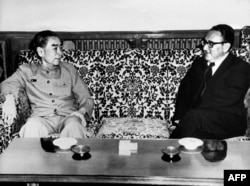To Beijing and the Chinese Communist Party, Henry Kissinger was “a most valued old friend” for his role in reestablishing ties with the U.S. after 20 years of postwar hostility.
But after his death this week at 100, Chinese people online expressed mixed feelings about the American who, with then-Chinese Premier Zhou Enlai and U.S. President Richard Nixon in 1972, cleared a path for the impoverished nation to become an economic rival to the U.S.
Some said they will always remember him as China’s “last old friend,” while others criticized Kissinger for giving in to the Chinese Communist Party (CCP).
As of Friday, the hashtag #KissingerDeath# on Weibo, China’s biggest but heavily censored social media site, topped the hot search list with nearly 600 million readers. Netizens left condolence comments like “Kissinger, the Chinese people will always remember you,” “Kissinger is the only American respected by Chinese people” and “My grandma knew who Kissinger was and she was born in 1912 and had bound feet.”
In announcing his death at home in the U.S. state of Connecticut on Wednesday, Kissinger’s official website mentioned “China” 11 times.
Kissinger visited China more than 100 times since 1971. He claimed in a speech in October in New York that “I’ve spent literally half of my life working on U.S.-China relations.”
On his last visit to China, in July 2023, Kissinger was received by Chinese President Xi Jinping, who belatedly celebrated the visitor’s 100th birthday with a lavish dinner in the room where Kissinger met Zhou Enlai in 1971.
On Thursday, Xi sent a message of condolence to U.S. President Joe Biden, saying “Kissinger’s name will always be associated with China-U.S. relations. Dr. Kissinger will always be remembered and missed by the Chinese people.”
Official media published articles under headlines such as “Farewell, old friend Kissinger!” and “The American who knows the most about China.” Photos of Kissinger smiling and shaking hands with senior CCP officials, visiting the terra cotta warriors, enjoying Chinese cuisine with his family and chatting with farmers accompanied the commemorative articles.
But some online opinion leaders said the Chinese people should be wary of Kissinger’s appearance of friendliness and his emphasis on his American and Jewish identity. The influencers said Kissinger’s actions ultimately only served U.S. national interests.
A Weibo user with the handle Master Li Wuwei and more than 400,000 followers said that no matter how many times Kissinger came to China, he was not China’s benefactor, but a force for U.S. interests.
“China is Kissinger’s benefactor, not the other way around,” said Master Li Wuwei. “It is precisely because of the special mission in the special historical period of China-US relations, Kissinger could always be mentioned by the Chinese for decades.”
Diverse thoughts on Kissinger’s legacy also have come from overseas Chinese including Zhou Fengsuo, who, in 1989, was a student leader who helped organize the pro-democracy movement in Tiananmen Square.
“On the day of June 4 massacre in 1989, when interviewed by ABC News, Kissinger opposed all sanctions against the Chinese Communist Party,” Zhou wrote on X, formerly Twitter.
“He did not disclose that he had already partnered with the state-owned company CITIC to set up a fund ‘China Ventures.’ Judged with current standards, is it not that Kissinger should have been registered as an agent of the CCP?”
Zhou is now executive director of the nongovernmental organization Human Rights in China, in the U.S.
Former Chinese private entrepreneur, Hu Liren, a Christian who now lives in the U.S., said on X that “Kissinger has created the biggest devil (CCP) in human history. This devil has brought huge disasters to the world and will cause endless troubles in the future. He is a sinner in history and is not worth remembering.”
Chinese pro-democracy activist Wei Jingsheng wrote on X, “From the American point of view, he cracked the Communist camp that led to the final collapse of the China-Soviet relationship. From the Chinese perspective, he saved and benefited from Mao’s regime. And he continued to support the tyranny of the CCP to this day.”
Wei lives in the U.S. and works with the Wei Jingsheng Foundation in Washington.

